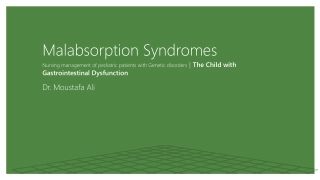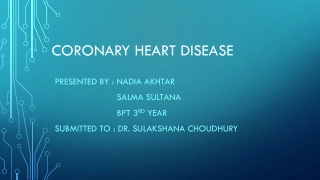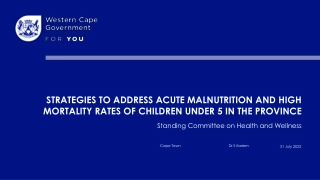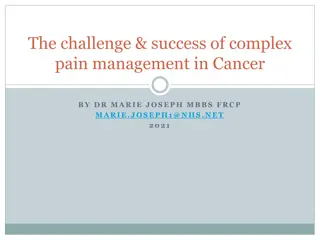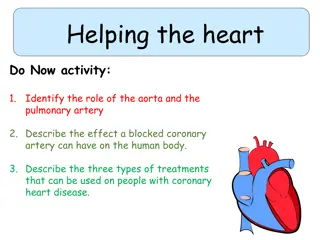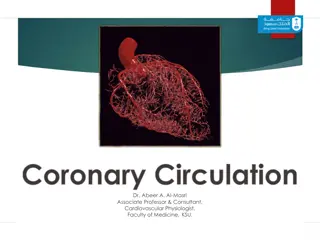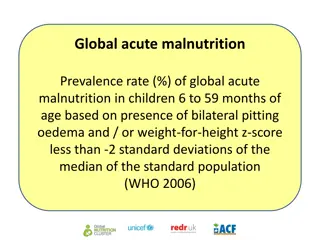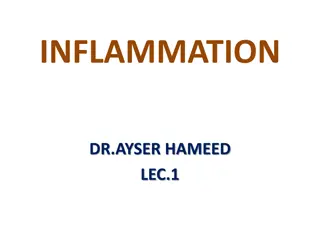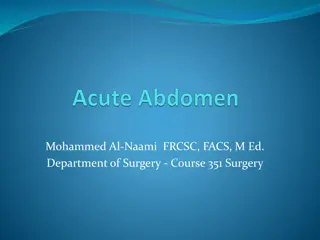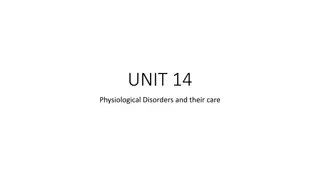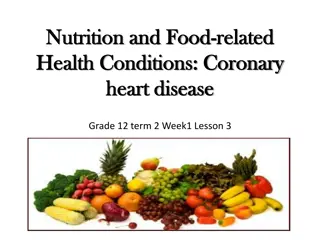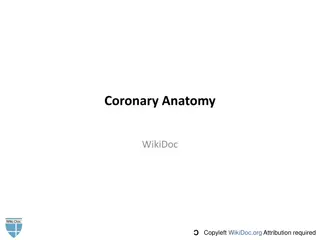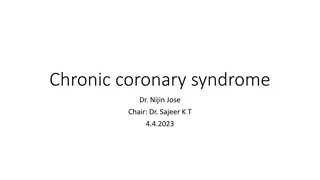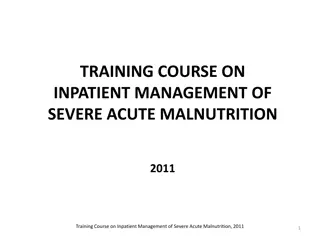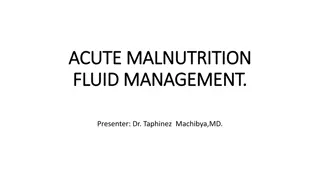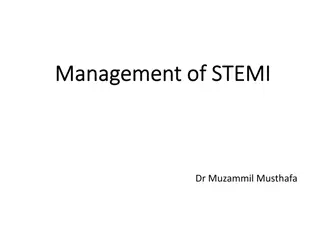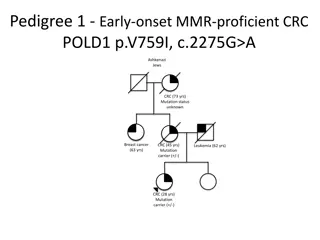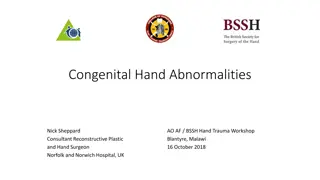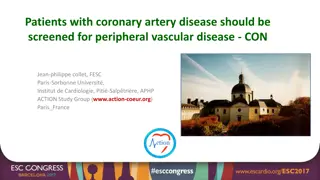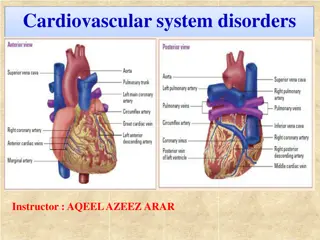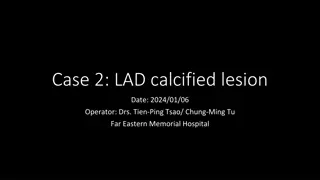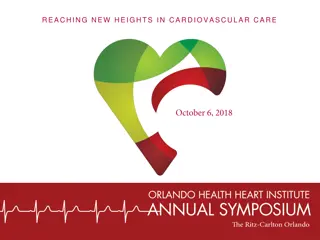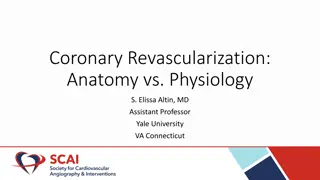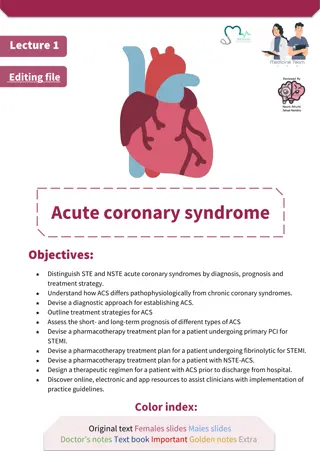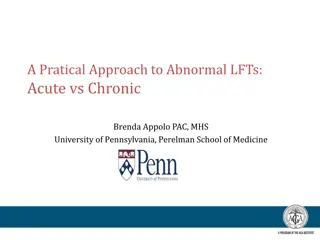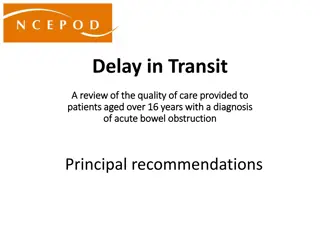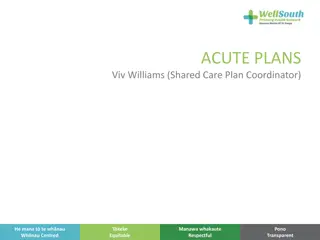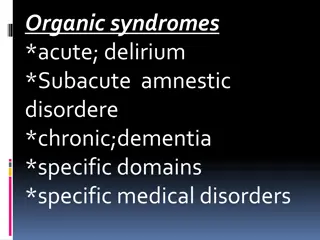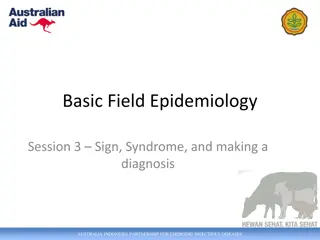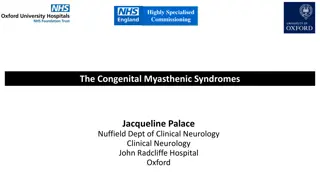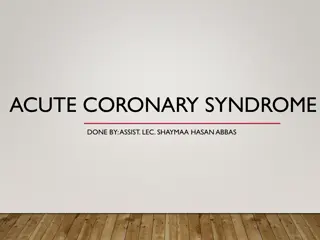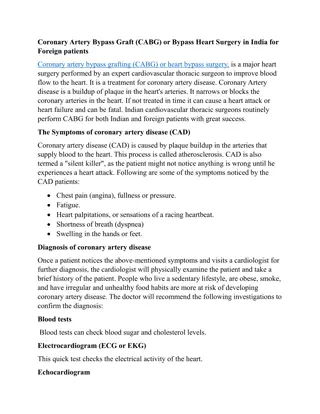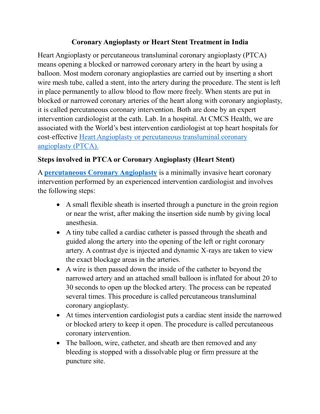Malabsorption Syndromes
The nursing management of pediatric patients with malabsorption syndromes, including identification of common gastrointestinal problems, implementation of the nursing process, and nutritional therapies.
31 views • 24 slides
Diagnosis and Management of Acute HIV Infection
Guideline aims to recognize the risks, signs, and symptoms of acute HIV infection and to promote HIV testing in individuals presenting with flu-like symptoms or viral syndromes. It provides recommendations for diagnostic testing, treatment, and prevention services to improve patient health and reduc
0 views • 19 slides
Coronary Heart Disease
Coronary heart disease, including its introduction, pathophysiology, types, signs and symptoms, diagnosis, management, and risk factors. It also discusses the epidemiology and complications associated with the disease.
2 views • 23 slides
Non Coronary Vascular Stents
Safe scanning of patients with non-coronary vascular stents (NCVS) in MRI settings in NHS Scotland. It covers key questions regarding the safety of patients with NCVS, including risks associated with MRI at different strengths, timing of MRI post-stent implantation, and the safety of various stent m
1 views • 9 slides
Strategies to Address Acute Malnutrition and High Mortality Rates in Children Under 5
Malnutrition in children under 5, specifically acute malnutrition, is a pressing issue in the Western Cape. This presentation outlines the current strategies, multisector engagement, causes, and impacts of acute malnutrition. It delves into the classifications of malnutrition, including severe and m
1 views • 38 slides
Ticagrelor Monotherapy vs. 12-Month Dual Anti-Platelet Therapy After Coronary Stent Implantation for ACS
The study compares the efficacy of ticagrelor monotherapy after less than 1 month of dual anti-platelet therapy (DAPT) to 12-month ticagrelor-based DAPT in patients with acute coronary syndrome (ACS) undergoing percutaneous coronary intervention (PCI) with drug-eluting stent implantation. The aim is
1 views • 19 slides
Understanding Coronary Artery Bypass Graft (CABG) in Adult Nursing
Coronary Artery Bypass Graft (CABG) is a surgical procedure where a blood vessel from another part of the body is grafted onto an occluded coronary artery to bypass blockages. This procedure is less common in women compared to men and is typically indicated for severe coronary artery disease. It is
5 views • 15 slides
Complexity in Cancer Pain Management by Dr. Marie Joseph
Dr. Marie Joseph explores the challenges and successes of managing complex pain in cancer patients. The intricacies of neuropathic pain, diagnostic characteristics, pathophysiology, pharmacology, and typical cancer pain syndromes are discussed. Strategies such as co-analgesic adjuvants, analgesic sy
0 views • 12 slides
Understanding Heart Health: A Comprehensive Guide
Explore the critical roles of the aorta, pulmonary artery, and coronary arteries in heart function. Discover the impact of a blocked coronary artery and learn about treatments for coronary heart disease. Delve into common heart problems, like leaky valves and irregular heartbeat, and how innovations
0 views • 15 slides
Understanding Coronary Circulation and Arterial Supply in Cardiovascular Physiology
Explore the intricate details of coronary circulation, including arterial supply, branches of coronary arteries, and areas of distribution. Dr. Abeer Al-Masri, an Associate Professor and Cardiovascular Physiologist at the Faculty of Medicine, KSU, provides valuable insights on the topic, covering th
1 views • 30 slides
Global Nutrition Prevalence Rates in Children and Women
This content highlights the prevalence rates of acute malnutrition, severe acute malnutrition (SAM), moderate acute malnutrition (MAM), childhood stunting, acute malnutrition based on MUAC and edema, and acute malnutrition in pregnant and lactating women. The data is based on various criteria such a
9 views • 37 slides
Understanding Inflammation and Its Characteristics
Inflammation is the response of tissues to harmful agents, categorized as acute or chronic. Acute inflammation is rapid and short-lived, while chronic inflammation is insidious and prolonged. Chemical mediators play a crucial role in both forms, leading to tissue necrosis. The five cardinal signs of
3 views • 27 slides
Comprehensive Overview of Acute Abdomen Assessment and Management
This detailed guide covers the definition, general approach, history taking, physical examination, investigations, diagnosis, and management of acute abdomen cases. Learn about common causes, such as acute appendicitis, bowel obstruction, and medical conditions. Real-life scenarios illustrate differ
2 views • 15 slides
Understanding Physiological Disorders: Rheumatoid Arthritis and Coronary Heart Disease
Explore the causes, effects, and treatment of Rheumatoid Arthritis and Coronary Heart Disease as part of investigating physiological disorders. Delve into the impact on the physical, mental, and emotional health of service users. Gain insights into the diagnosis, treatment, and support necessary for
0 views • 27 slides
Understanding the Impact of Nutrition on Coronary Heart Disease
Explore the relationship between nutrition and coronary heart disease through images depicting blood cholesterol levels, food pyramids for both healthy individuals and those with high cholesterol, and methods to increase fiber in your diet. Understand how cholesterol buildup in arteries can lead to
0 views • 13 slides
Understanding Coronary Artery Anatomy and Dominance
Explore the intricate details of coronary artery anatomy with a focus on the right and left coronary arteries, as well as variations such as large right dominance, small right dominance, co-dominance, and left dominance. Learn about the importance of understanding these structures in relation to car
0 views • 8 slides
Understanding Chronic Coronary Syndrome: Causes, Symptoms, and Management
Chronic coronary syndrome involves a dynamic process of atherosclerotic plaque accumulation and functional alterations in coronary circulation. It includes various clinical scenarios such as stable angina, asymptomatic ischemia, prior myocardial infarction, and more. The condition can be modified by
0 views • 131 slides
Inpatient Management of Severe Acute Malnutrition Training Course 2011
This training course focuses on inpatient management of severe acute malnutrition, teaching procedures outlined in the national Community-Based Management of Severe Acute Malnutrition Guidelines. The training aims to reduce case fatality rates significantly and is designed for physicians, senior nur
0 views • 9 slides
Acute Malnutrition - Fluid Management and Treatment Overview
Acute malnutrition, particularly severe acute malnutrition (SAM), requires careful fluid management and a structured treatment approach involving stabilization, transition, and rehabilitation phases. This condition results from inadequate dietary intake or acute infections, leading to severe wasting
0 views • 23 slides
Overview of Acute Coronary Syndrome and Myocardial Infarction
Acute Coronary Syndrome (ACS) encompasses a spectrum of conditions involving reduced blood flow in the heart. Ischemic Heart Disease (IHD) is a leading cause of mortality worldwide, with ST-elevation myocardial infarction (STEMI) being more common in younger men. Prompt diagnosis, treatment, and adh
1 views • 73 slides
Familial Colorectal Cancer Syndromes: Genetic Profiles and Clinical Presentations
These pedigrees depict familial colorectal cancer syndromes in Ashkenazi and Iraqi Jews, showcasing early-onset MMR-proficient CRC cases linked to mutations in POLD1 and POLE genes. The pedigrees detail various cancer diagnoses, mutation carrier statuses, and ages of onset across multiple generation
0 views • 5 slides
Understanding Congenital Hand Abnormalities and Associated Syndromes
Explore congenital hand abnormalities such as macrodactyly, trigger thumb, clasped thumb, preaxial deficiency, and syndromes like Holt-Oram Syndrome and Fanconi Anemia. Learn about assessment, intervention plans, and common treatments provided by experts in reconstructive plastic and hand surgery.
1 views • 26 slides
Screening for Peripheral Vascular Disease in Patients with Coronary Artery Disease
Patients with coronary artery disease should be screened for peripheral vascular disease as it is a frequent integrator of global cardiovascular risk. The association of atherosclerosis in various arterial diseases highlights the importance of identifying multisite artery disease. The prevalence and
0 views • 23 slides
Understanding Acute Coronary Syndromes: Causes, Symptoms, and Risk Factors
Acute coronary syndromes (ACS) encompass a spectrum of conditions such as unstable angina, non-ST-segment elevated MI (NSTEMI), and ST-segment elevated MI (STEMI) that result from coronary artery occlusion. Risk factors for ACS include family history of heart disease, obesity, smoking, and hypertens
0 views • 20 slides
Case Study: Successful Treatment of LAD Calcified Lesion with Percutaneous Coronary Intervention
A case study dated 2024/01/06 from Far Eastern Memorial Hospital involving the treatment of a calcified lesion in the LAD artery using percutaneous coronary intervention. The procedure included wire and sheath insertion, angiography, OCT imaging revealing severe calcification, rotablation, IVL, sten
0 views • 7 slides
Advancements in Hybrid Coronary Revascularization
Explore the evolution of hybrid coronary revascularization in cardiovascular care, guided by the 2011 ACC/AHA guidelines. This groundbreaking approach combines LIMA-to-LAD grafting with PCI for complex CAD cases, offering a promising alternative to traditional CABG or multivessel PCI. The integratio
0 views • 45 slides
Understanding Coronary Revascularization: Anatomy vs. Physiology
This content discusses the prevalence of angina in women compared to men, the importance of stable angina in predicting outcomes, the need for better diagnostic methods for coronary angiography, and the differences in obstructive CAD by sex and ethnicity in stable angina cases. It highlights the cha
0 views • 22 slides
Understanding Acute Coronary Syndrome Differentiation and Treatment
Learn to distinguish between STE and NSTE acute coronary syndromes in terms of diagnosis, prognosis, and treatment strategies. Understand the pathophysiological differences between ACS and chronic coronary syndromes. Gain insight into diagnostic approaches, treatment regimens, and prognosis for vari
0 views • 15 slides
Understanding Abnormal Liver Function Tests: Acute vs. Chronic Approach
Comprehensive discussion on assessing patients with abnormal liver test results, focusing on distinguishing between acute and chronic liver conditions. Covers diagnostic workup, patient cases, and differential diagnosis, emphasizing the importance of patient history, physical examination, and key di
0 views • 16 slides
Review of Care for Patients with Acute Bowel Obstruction: Recommendations and Key Findings
This review assesses the quality of care provided to patients aged over 16 years with acute bowel obstruction. Significant delays were identified in the care pathway, from imaging requests to availability of operating theatres. Recommendations include prompt CT scans with intravenous contrast for de
0 views • 32 slides
Comprehensive Guide to Creating and Understanding Acute Care Plans
This comprehensive guide provides detailed information on creating and understanding acute care plans, including the purpose of an acute plan, who needs one, what information can be written in an acute plan, examples of baseline clinical parameters, alerts to more detailed plans, and insights into c
0 views • 17 slides
Understanding Organic Syndromes: Delirium, Subacute Amnestic Disorder, and Chronic Dementia
Explore the spectrum of organic syndromes including delirium, subacute amnestic disorder, and chronic dementia. Delve into the definitions, statistics, causes, management strategies, classifications, and reversible dementias associated with these conditions.
0 views • 13 slides
Epidemiology of Hepatitis B and C in Florida: 2019 Data Analysis
The Department of Health in Florida has released the 2019 data on the epidemiology of Hepatitis B and C as of January 21, 2021. The report includes information on acute and chronic cases, technical notes on case definitions, and changes in national case definitions in 2020. Acute cases require speci
0 views • 35 slides
Understanding Signs, Syndromes, and Diagnoses in Epidemiology Session
Explore the significance of signs of disease, syndromes, and making accurate diagnoses in the context of the Australia-Indonesia Partnership for Emerging Infectious Diseases. Engage in activities to differentiate between signs and syndromes, identify characteristics of healthy and unhealthy animals,
0 views • 18 slides
Specialised Commissioning for Congenital Myasthenic Syndromes - Overview by Professor Jacqueline Palace
Delve into the highly specialised commissioning of Congenital Myasthenic Syndromes by Professor Jacqueline Palace from the Nuffield Department of Clinical Neurology at John Radcliffe Hospital, Oxford. Explore key messages, learning objectives, and disclosures related to diagnosing, differentiating,
0 views • 4 slides
Approach to Acute Flaccid Paralysis in Children: Evaluation and Management
Acute muscular weakness in children is a neurological emergency defined by sudden onset muscle weakness or paralysis in less than 5 days. When evaluating a child with acute flaccid paralysis, consider factors like onset rhythm, associated symptoms, and past medical history. A thorough physical and n
0 views • 45 slides
Children's Hospital @ Home: Acute Nursing Care in Tower Hamlets
Providing acute nursing care for children at home from 8 am to 10 pm, the Children's Hospital @ Home in Tower Hamlets offers services such as IVABs, NGT re-insertion, acute assessment, wheeze management, and home-based phototherapy. The initiative aims to reduce hospital stays, minimize admissions f
0 views • 7 slides
Understanding Acute Coronary Syndrome: Diagnosis and Immediate Therapies
A 58-year-old man presents with acute severe chest pain, diaphoresis, dyspnea, and risk factors for coronary heart disease. The most likely diagnosis is acute myocardial infarction. Immediate steps include placing the patient on a cardiac monitor, obtaining an ECG, and administering aspirin. Additio
0 views • 19 slides
Coronary Artery bypass graft - Bypass heart surgery
Coronary artery bypass grafting (CABG) or heart bypass surgery, is a major heart surgery performed by an expert cardiovascular thoracic surgeon to improve blood flow to the heart. It is a treatment for coronary artery disease. Coronary Artery disease
0 views • 3 slides
Coronary Angioplasty or Heart Stent Treatment in India
Heart Angioplasty or percutaneous transluminal coronary angioplasty (PTCA) means opening a blocked or narrowed coronary artery in the heart by using a balloon. Most modern coronary angioplasties are carried out by inserting a short wire mesh tube, ca
2 views • 4 slides
